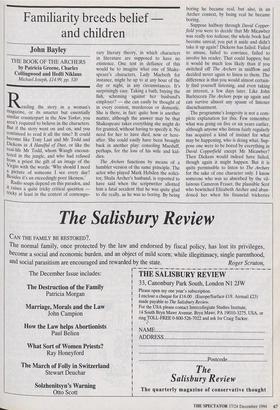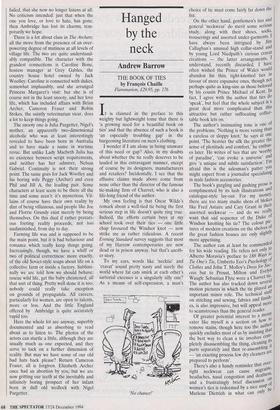Familiarity breeds belief and children
John Bayley
THE BOOK OF THE ARCHERS by Patricia Greene, Charles Collingwood and Hedli Niklaus Michael Joseph, £14.99, pp. 320 Reading the story in a woman's magazine, or its smarter but essentially similar counterpart in the New Yorker, you aren't required to believe in the characters. But if the story went on and on, and you continued to read it all the time? It could become like Tony Last and Mr Todd and Dickens in A Handful of Dust, or like the real-life Mr Todd, whom Waugh encoun- tered in the jungle, and who had refused Virgin a priest the gift of an image of the v irgin with the words: 'Why should I need a picture of someone I see every day? Besides it's an exceedingly poor likeness.' Radio soaps depend on this paradox, and it raises a quite tricky critical question - tricky at least in the context of contempo- rary literary theory, in which characters in literature are supposed to have no existence. One test in defiance of this would be to imagine what one of Shake- speare's characters, Lady Macbeth for instance, might be up to at any hour of the day or night, in any circumstances. It's surprisingly easy. Taking a bath, buying the fish, scheming against her husband's employer? — she can easily be thought of in every context, murderous or domestic. She is there, in fact: quite how is another matter, although the answer may be that Shakespeare takes everything she might do for granted, without having to specify it. No need for her to have died, now or here- after. She could easily have been brought back in another play: consoling Macduff, perhaps, for the loss of his wife and kid- dies.
The Archers functions by means of a humbler version of the same principle. The actor who played Mark Hebden the solici- tor, Shula Archer's husband, is reported to have said when the scriptwriter allotted him a fatal accident that he was quite glad to die really, as he was so boring. By being boring he became real, but also, in an Archer context, by being real he became boring.
Suppose halfway through David Copper- field you were to decide that Mr Micawber was really too tedious; the whole book had become unreal; you put it aside and didn't take it up again? Dickens has failed. Failed to amuse, failed to convince, failed to involve his reader. That could happen; but it would be much less likely than if you switched off The Archers in midflow and decided never again to listen to them. The difference is that you would almost certain- ly find yourself listening, and even taking an interest, a few days later. Like John Barleycorn The Archers pops up again and can survive almost any spasm of listener disenchantment.
The programme's longevity is not a com- plete explanation for this. Few remember what was going on five or six years earlier, although anyone who listens fairly regularly has acquired a kind of instinct for what may be happening, who is doing what. Sup- pose one were to be bored by everything in David Copperfield except Mr Micawber? Then Dickens would indeed have failed, though again it might happen. But it is quite permissible to listen to The Archers for the sake of one character only. I know someone who was so absorbed by the vil- lainous Cameron Fraser, the plausible Scot who bewitched Elizabeth Archer and aban- doned her when his financial trickeries failed, that she now no longer listens at all. No criticism intended: just that when the one you love, or love to hate, has gone, then Ambridge has lost its charms, tem- porarily we hope.
There is a lot about class in The Archers; all the more from the presence of an over- powering degree of matiness at all levels of village life. The two are quite understand- ably compatible. The character with the grandest connections is Caroline Bone, hostess manager at Grey Gables, the country house hotel owned by Jack Woolley. Caroline is connected with dukes, somewhat implausibly, and she arranged Princess Margaret's visit: but she is of course not in the least snooty, and her love life, which has included affairs with Brian Archer, Cameron Fraser and Robin Stokes, the saintly veterinarian vicar, does a lot to keep things going.
The snooty one is Julia Pargetter, Nigel's mother, an apparently two-dimensional alcoholic who was at least interestingly revealed to have been born in Australia and to have made a name in wartime revue. But unlike Lady Macbeth Julia has no existence between script requirements, and neither has her admirer, Nelson Gabriel. Continuity is not their strong point. The same goes for Jack Woolley and his boring wife Peggy (Archer) and even Phil and Jill A, the leading pair. Some characters at least seem to be there all the time and some aren't: it's mysterious. Vil- lains of course have their own reality by dint of being villainous, and people like Joe and Florrie Grundy exist merely by being themselves. On this dual if rather precari- ous footing reality proceeds, not too undiminished, from day to day.
Farming life was and is supposed to be the main point, but it is bad behaviour and romance which really keep things going. Increasingly, though, we have a whiff or two of political correctness: more exactly, of the old Soviet-style soaps about life on a collective farm or inside a factory. Sublimi- nally we are told how we should behave: rescue wild life, get the baby christened, all that sort of thing. Pretty well done it is too; nobody could really take exception on grounds of propaganda. All careers, particularly for women, are open to talents, more or less. And the little England offered by Ambridge is quite accurately vapid too.
Here the whole lot are anyway, superbly documented and as absorbing to read about as to listen to. The photos of the actors can startle a little, although they are usually much as one expected, and they serve to tack on a further dimension of reality. But may we have some of our old bad hats back please? Return Cameron Fraser, all is forgiven, Elizabeth Archer once had an abortion by you, but we are now gritting our teeth at the inevitable and infinitely boring prospect of her infant born in dull old wedlock with Nigel Pargetter.











































































































 Previous page
Previous page